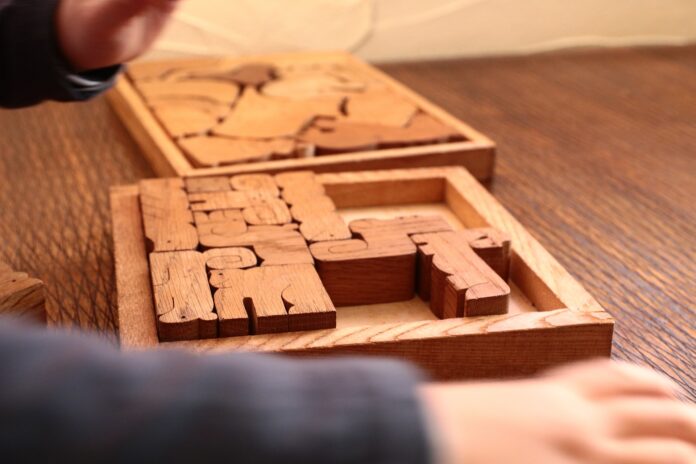Wooden puzzles have been a popular pastime for centuries, and for good reason. Not only are they a fun and challenging way to pass the time, but they also offer a number of benefits for your brain. In this blog post, we’ll explore some of the reasons why wooden puzzles are good for your brain and how they can help to improve your cognitive skills.
They require concentration and focus
Wooden puzzles require a high level of concentration and focus, and this can be a great way to improve your attention to detail and problem-solving skills. When you work on a puzzle, you must pay close attention to the details of the pieces and how they fit together. This helps to improve your ability to focus and concentrate.
In addition to improving your concentration and focus, puzzles can also help to improve your problem-solving skills. When working on a puzzle, you must think critically about how to fit the pieces together, and this can help to improve your ability to solve problems and think creatively. By challenging your brain to think in new and different ways, puzzles can help to improve your problem-solving skills and enhance your overall cognitive abilities.
Another benefit of wooden puzzles is that they can help to stimulate your brain and keep it active. When you solve a puzzle, you are using a number of different cognitive skills, including spatial awareness, and critical thinking. This helps to keep your brain active and engaged, and can help to prevent a decline in cognitive function as you age.
Wooden puzzles improve memory
Solving wooden puzzles can be an excellent way to boost your memory and improve your ability to retain information. As you work on a puzzle, your brain is constantly processing and storing information about the different pieces and how they fit together. This helps to strengthen your memory and improve your ability to remember details.
One of the ways that puzzles help to improve memory is by forcing you to pay attention to the details of the puzzle. And when you have an original puzzle to solve, like the wooden puzzles from Lubiwood, you definitely need to pay attention! In order to solve the puzzle, you must carefully observe the different pieces and how they fit together. This helps to improve your attention to detail and your ability to remember small, specific pieces of information.
Wooden puzzles reduce your stress and improve your mood
Solving wooden puzzles can be a great way to reduce stress and improve your overall mood. When you work on a puzzle, your brain is focused on the task at hand and you are able to escape from the stresses of everyday life. This can help to relax your mind and reduce feelings of anxiety and stress.
In addition to providing a sense of calm and relaxation, solving puzzles can also help to improve your mood by releasing endorphins. Endorphins are chemicals produced by the brain that help to improve your mood and reduce feelings of stress and anxiety. When you solve a puzzle, your brain releases endorphins, which can help to improve your overall mood and make you feel happier and more content.
Another way that puzzles can help to reduce stress and improve your mood is by providing a sense of accomplishment. When you solve a puzzle, you feel proud of yourself for achieving something that was challenging and rewarding. This sense of accomplishment can boost your self-esteem and improve your overall mood.
Overall, wooden puzzles are a great way to relax and unwind after a long day. They can help to reduce stress and improve your mood, making them a great activity for anyone looking to relax and de-stress. So next time you’re feeling overwhelmed or stressed, consider picking up a puzzle and giving it a try. You might be surprised at how much it can help to improve your mood and reduce stress.
Conclusion
Overall, solving wooden puzzles is a great way to improve your memory and cognitive skills, and it can be a fun and enjoyable activity for people of all ages. So why not pick up a puzzle and give it a try? You might be surprised at how much it can help to boost your memory and cognitive abilities.

